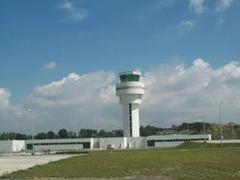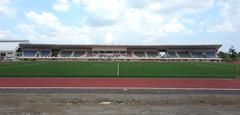Visiting Monfort Bat Sanctuary: Hours, Tickets, and Tips
Date: 24/07/2024
Introduction
Nestled on Samal Island, just a short ferry ride from Davao City, the Monfort Bat Sanctuary stands as a beacon of conservation and ecological importance. Established in 1973 by Norma Monfort, the sanctuary was created to protect the millions of Geoffrey’s Rousette fruit bats that call it home (Davao Corporate). Over the decades, this site has achieved global recognition, notably earning the Guinness World Record in 2010 for housing the largest colony of these fruit bats, with a population now estimated at approximately 2.5 million (Rappler). The bats play a crucial role in pollinating and dispersing seeds of fruit-bearing trees, contributing significantly to the region’s agricultural productivity. The sanctuary’s efforts have not only focused on the conservation of these bats but also on broader ecological impacts, such as forest regeneration and enhancing soil fertility through bat guano (Philippine Traveler). This guide is designed to provide comprehensive information on the Monfort Bat Sanctuary, covering its rich history, visitor details, and the sanctuary’s vital role in both local and global ecosystems.
Table of Contents
- Introduction
- History and Significance
- Visitor Information
- Economic and Educational Impact
- Cultural Significance
- FAQ
- Conclusion
History and Significance
Origins and Establishment
The Monfort Bat Sanctuary was established in 1973 by Norma Monfort, who recognized the ecological importance of bats. She enclosed the property and hired guards to protect the bats, thus laying the foundation for what would become a globally recognized conservation site (Davao Corporate).
Guinness World Record Recognition
In 2010, the sanctuary gained international acclaim when it was awarded the Guinness World Record for housing the largest colony of Geoffrey’s Rousette fruit bats. The population, initially estimated at 1.8 million, has now grown to approximately 2.5 million (Rappler).
Ecological Importance
As frugivores, the bats play a crucial role in pollinating and dispersing seeds of fruit-bearing trees, contributing to the region’s agricultural productivity. Their guano is a highly effective fertilizer, enhancing soil fertility (Philippine Traveler).
Conservation Efforts
In 2006, Monfort collaborated with Bat Conservation International to protect the cave as the Monfort Bat Conservation Park. She also established the Philippines Bat Conservation group to promote the conservation of all Philippine bat species (Rappler).
Scientific Research and Discoveries
The sanctuary has been a site for significant scientific research. In 2011, an American cave-mapping expedition discovered a high number of pregnant bats in the colony, highlighting the need for further study (Rappler).
Challenges and Future Plans
Despite its successes, the sanctuary faces challenges like overcrowding and human disturbance. Plans to build an artificial cave, known as a chiropterium, are in place to accommodate the growing bat population (Chase Jaseph).
Visitor Information
Visiting Hours and Ticket Prices
The Monfort Bat Sanctuary is open daily from 8:00 AM to 5:00 PM. Ticket prices are affordable, with special rates for children and seniors (Inquirer).
Travel Tips
Visitors are advised to wear comfortable clothing and bring water. Respecting the sanctuary’s rules is crucial to ensure minimal disturbance to the bats.
Nearby Attractions
Samal Island offers numerous attractions such as Hagimit Falls and the Vanishing Island, making it a great destination for a day trip.
Special Events and Guided Tours
The sanctuary offers guided tours that provide in-depth information about bat conservation. Special events are held during peak seasons, enhancing the visitor experience.
Photographic Spots
The sanctuary provides excellent photographic opportunities, especially during sunset when the bats are most active.
Economic and Educational Impact
The sanctuary has become a top tourist attraction, boosting local tourism and providing economic benefits. Educational programs and volunteer opportunities further enhance its impact (Philippine Traveler).
Cultural Significance
The Monfort Bat Sanctuary stands as a testament to the Philippines’ rich biodiversity and the local community’s commitment to conservation. Its success has inspired other conservation efforts in the region (Chase Jaseph).
FAQ
- What are the visiting hours for Monfort Bat Sanctuary? The sanctuary is open daily from 8:00 AM to 5:00 PM.
- How much are the tickets for Monfort Bat Sanctuary? Ticket prices vary, with special rates for children and seniors.
Conclusion
The Monfort Bat Sanctuary is a prime example of successful conservation efforts that have both ecological and economic benefits. From its origins in 1973 to its recognition by the Guinness World Records, the sanctuary has grown to support a thriving bat population while educating the public about the importance of these creatures (Rappler). Despite facing challenges such as overcrowding and human disturbance, the sanctuary continues to innovate, with plans to build an artificial cave to accommodate the growing bat population (Chase Jaseph). Visitors not only get to witness the spectacular circadian flight of millions of bats but also contribute to local tourism and conservation efforts. Through guided tours and educational programs, the sanctuary raises awareness about the bats’ ecological role in pollination, seed dispersal, and forest regeneration (SunStar). As a testament to the Philippines’ rich biodiversity and commitment to conservation, the Monfort Bat Sanctuary continues to inspire and educate, making it a must-visit destination for nature enthusiasts and curious travelers alike.
References
- Davao Corporate (n.d.). Monfort Bat Sanctuary. Retrieved from https://davaocorporate.info/listings/monfort-bat-sanctuary/
- Rappler (2014). Monfort Bat Sanctuary: Samal, Davao del Norte. Retrieved from https://www.rappler.com/environment/75913-monfort-bat-sanctuary-samal-davao/
- Philippine Traveler. (n.d.). Monfort Bat Cave: Samal, Philippines. Retrieved from https://www.philippinetraveler.com/monfort-bat-cave-samal-philippines/
- SunStar (n.d.). Into the Bat World. Retrieved from https://www.sunstar.com.ph/davao/feature/into-the-bat-world
- Chase Jaseph (n.d.). Monfort Bat Sanctuary: Samal, Davao Del Norte Travel Guide Tips. Retrieved from https://chasejaseph.com/monfort-bat-sanctuary-samal-davao-del-norte-travel-guide-tips/
- Edge Davao (2023). Fast Backward: Monfort’s Bat Cave. Retrieved from https://edgedavao.net/vantage-points/2023/01/fast-backward-monforts-bat-cave/
- Vigattin Tourism. (n.d.). Monfort Bat Sanctuary. Retrieved from https://www.vigattintourism.com/index.php?/tourism/articles/Monfort-Bat-Sanctuary
- Real Breeze Davao Tours (n.d.). Monfort Bat Sanctuary Tour Packages. Retrieved from http://realbreezedavaotours.com/TourPackages/monfort-bat-sanctuary/
- Go Travel First (n.d.). Davao Tour: Monfort Bat Sanctuary and Hagimit Falls. Retrieved from https://gotravelfirst.com/davao-tour-monfort-bat-sanctuary-and-hagimit-falls/

